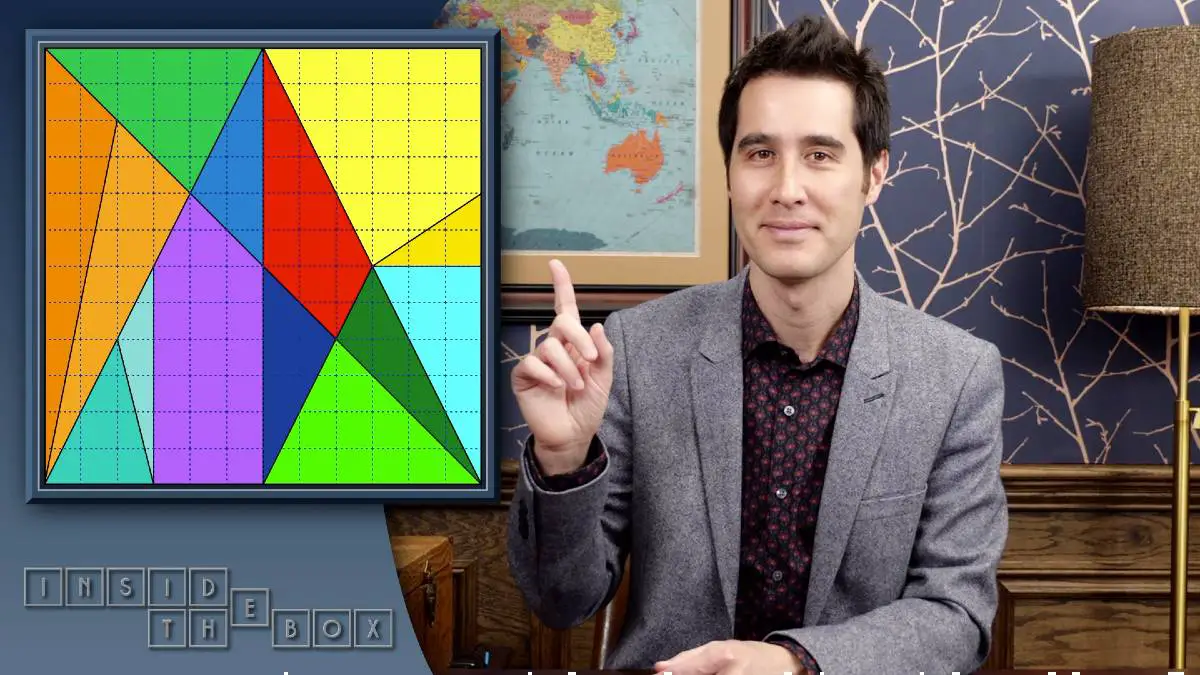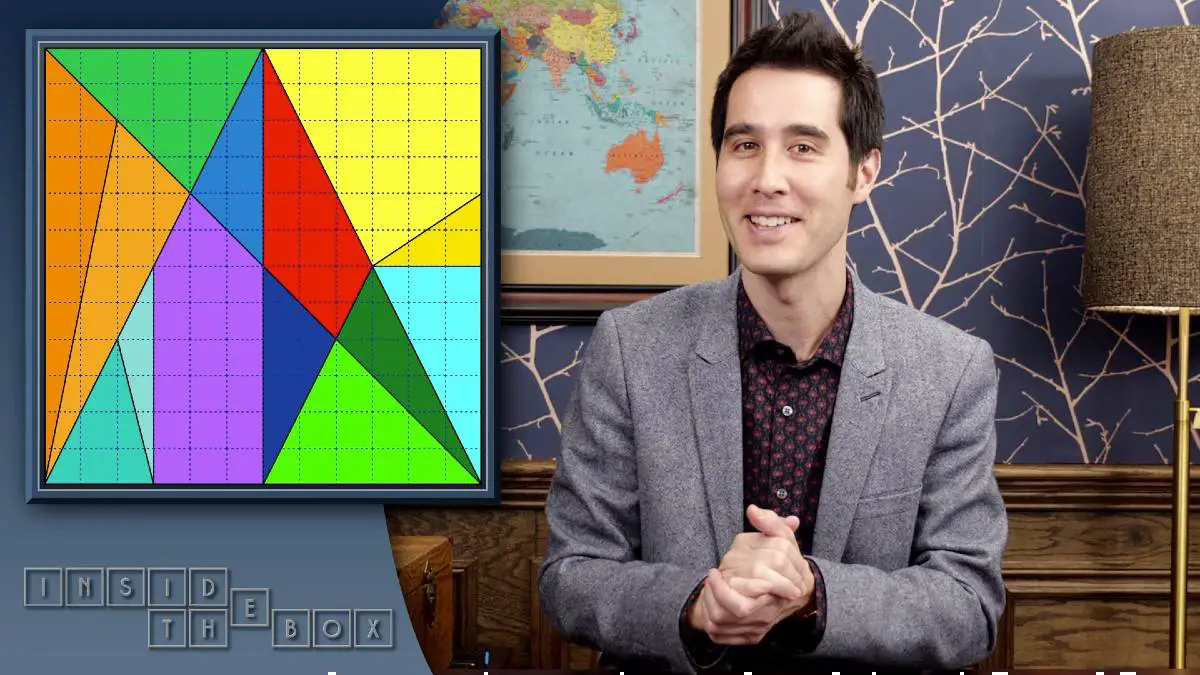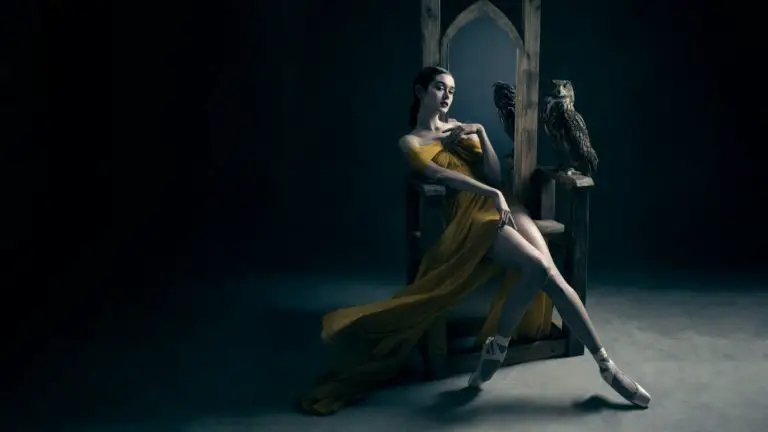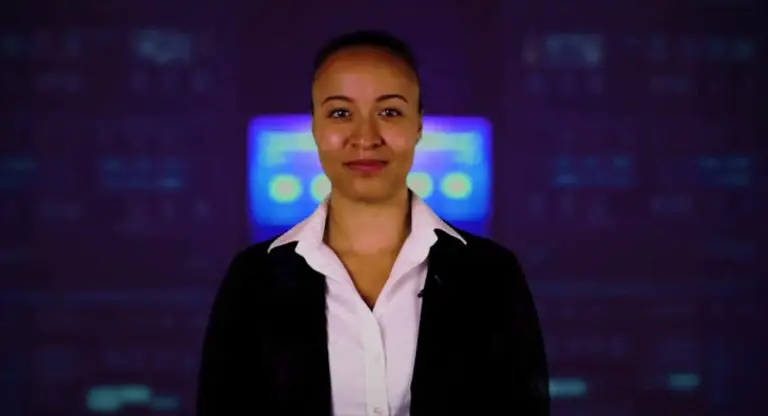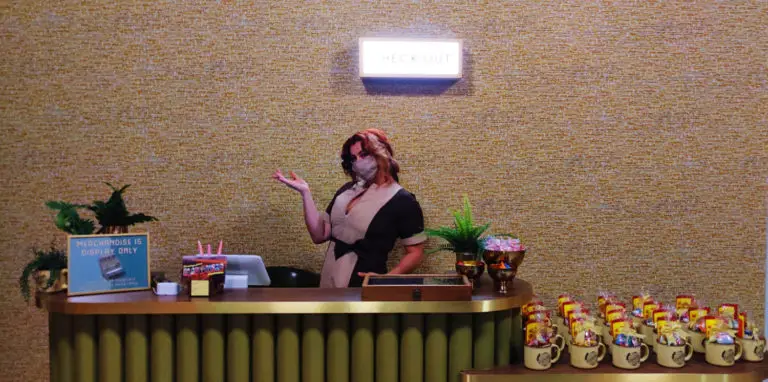The following is a review of Inside the Box from The Geffen “Stayhouse.” It contains mild spoilers around structure and themes.
There’s a twinkle in David Kwong’s eyes as he explains to us what a “knight’s tour” is: a logic puzzle in which you must visit every spot on a chess board with your knight without repeating any spaces. His enthusiasm is evident, as is his pride as he reveals what he’s about to undertake. “I am going to complete a knight’s tour here and now, right in front of you, with your faces as the board. But I’m going to add a layer, just to stretch my puzzle brain – I’m going to assign each of you a letter, and if I do this correctly, they will spell a clue phrase.” It’s not the last time that layered puzzles will come into play, but the audience can’t help but smile at the brazen undertaking. Sure enough, he pulls it off, demonstrating his mind’s unique capacity for verbal and mental gymnastics. With awe and applause, the audience scrambles to find the word revealed by the clue phrase. It’s “puzzle time” now, and we’re used to this flow of challenges. Naturally, before long, enthusiastic hand waves indicate to David that we’ve pieced it together.
The Puzzle Box
Geffen Playhouse’s Inside the Box is a puzzle-based, theatrical Zoom event that is part history lesson , part philosophical concept, and part group-puzzle competition. The 90-minute show consists of a series of eight types of puzzles punctuated by trivia, stories, and lessons meant to unite the group around the role of puzzles during adversity. The show is very hands-on, with a full puzzle packet and a handful of at-home props incorporated into each challenge. A non-trivial amount of set-up and effort is required prior to beginning the show, so participants should allow themselves time to prepare. The overall tone is cerebral, and this is definitely a brain-bender. As is customary for The Geffen, the end result is a highly polished experience.
David Kwong’s personable and enthusiastic presentation helps to make the show accessible for all, while simultaneously giving nods to fellow crossword or verbal puzzle enthusiasts. As is customary with Geffen Playhouse’s remote productions such as the recent and immensely popular The Present, a house manager is also on hand to troubleshoot technical issues and to transition the Zoom interface to spotlight patterns, answers, or audience contributions. The show is “challenge by choice,” as no one is ever required to volunteer an answer. All solutions are shared with the group, so no one is ever stuck for long, and everyone leaves with a satisfying solution to the show’s meta-puzzle. While guests do not need to volunteer any solutions, there is an expectation that their cameras remain on and they remain unmuted for the duration of the show, a tactic that has been used in other shows like TxtShow as well with great success. Be prepared to be active and thinking for most of the show if you want to get the most out of it. The point, after all, is the role of puzzles in alleviating the boredom and anxiety associated with tumultuous historical times. Overall, Inside the Box is a series of expertly crafted and creative verbal challenges and associated history lessons that hint at an overall theme.
Puzzles Through the Ages
Inside the Box is designed to be a hands-on survey course in verbal puzzle history. From crosswords and anagrams to splits and spoonerisms, participants are left with a deeper understanding of the breadth of puzzle types. Each puzzle is presented via multi-layered clues calculated to spark delight. One puzzle’s silly solution phrase may actually be a clue to the next lesson or part of a larger solution. Many of the puzzles have tactile elements as well and leverage printed materials to make group collaboration easier. Participants might move a token around a game board or hold up letters to turn the Zoom screen into a virtual board.
In addition to teaching the audience about the puzzles, Kwong also leads the group in solving numerous examples. Many of the sample puzzles are niche or hobby-specific, which allows the group to learn more about each other. A Harry Potter fan was lightning quick with one clue during my show, and a Long Island local was the only one to solve another one. Participants can expect a hands-on experience with a variety of creative word puzzles.
Acting
One of the best parts of Geffen remote shows is the use of a house manager to make the online experience feel more theatrical and seamless. Our house manager checked us in, explained our puzzle packets to us, and gave us guidelines for interaction during the show. During the show, the house manager would help people mute or unmute, and spotlight participating audience members. This unobtrusive but organization-oriented choice allows the experience to feel seamless and allows audience members to focus solely on the show.
As a storyteller, Kwong is fun and self-aware. He began the show by preparing us for his “dad jokes” and, true to form, there were a handful of them. Most of his stories and lessons take the tone of your favorite college professor’s lectures. He is focused, succinct and intelligent, and also maintains a casual atmosphere. Kwong is a natural with words and puzzles, but as an entertainer he’s fairly subdued. He does, however, connect the stories and puzzles with trivia and philosophy that feels timely and natural. For example, he might tie a beverage clue to its country of origin, or remind us of the way people have used puzzles to lighten the mood during previous times of uncertainty. Overall, his performance should be looked at as more of an insight into his mind, revealing connections over time. In fact, the entire show builds to a number of surprising patterns or connections that are hiding in the clues all along. If participants go into the show expecting an entertaining but cerebral exposition piece, they will likely find his tone and presence very enjoyable.
Kwong also shines as a puzzle facilitator. It can be unsettling to volunteer to solve a puzzle in front of an audience, but Kwong never makes anyone feel pressured or judged. In fact, in his introduction, he addresses that he expects a variety of experience and confidence levels among his audience members. He cheers, applauds, and celebrates authentically with every volunteer who successfully solves a puzzle, and troubleshoots where needed to help audience members find the answers. It’s a pleasure to see someone bring warmth, empathy, and a personal touch to what is otherwise a very cerebral show. He clearly finds joy in sharing his world with others and making word puzzles accessible for the enjoyment of all. Kwong’s facilitation allows audience members to relax into the show’s cadence and challenge themselves to their comfort level.
History Lessons
You might not expect to get a history lesson when you go to the theater, but that’s exactly what you’ll get from Inside the Box. From Japanese stick logic puzzles to Martin Gardner’s “mathemagician” skillset and mathematical games column, to Kwong’s own boundary-pushing “trivial pursuit” crossword puzzle, Kwong makes it a point to pay homage to some formative moments in puzzle history. His anecdotes span cultures and timeframes. With a very relatable mix of awe and chagrin he introduces the audience to the very first crossword puzzle ever published, before introducing a few of its most comical flaws. These history lessons allow him to connect the content to the current time. He tells the story of the adoption of crossword puzzles by The New York Times, and reminds the audience that it was ultimately the Great Depression that taught people the importance of puzzles, and that they are always most important during trying times.
The Puzzles Themselves
The puzzles of Inside the Box can be fairly challenging and taxing. This is definitely a show that is tailored toward those who already have a passion for word puzzles. There are a LOT of puzzles to solve, and each of the eight sections focuses on a single puzzle type and contains multiple rounds of the puzzle that is being taught. Around 60-70% of the show is spent on solving the puzzles. They’re fun and often funny, but if that’s not your bag, then you’re unlikely to enjoy the content and you may find yourself bored or frustrated. Many of of the puzzles require focus, cooperation, and trivia knowledge. The spoonerisms were particularly fun and silly to me, with the clue phrases often making me giggle at their ability to be abstract and yet so clear after the fact. I also enjoyed the knight’s tour based on a personal preference for chess, and the token puzzle was a fun example of how patterns can be manipulated to create the illusion of agency – mathemagic at its best. Overall, the puzzles are a lot of fun and range in difficulty, but a predisposition to puzzles is definitely a prerequisite for enjoying the show.
Engaging an Audience Inside the Box
Audience engagement comes primarily through volunteering to solve puzzles. After each puzzle, an audience member will be spotlighted on a small screen to give their answer. In certain cases, Kwong may riff with them on how the puzzle’s content relates to their background. The first time a participant answers, they’re also asked to make a brief introduction. Video and audio are required for the entire show, so Kwong will also often comment on funny reactions or on-screen activity. These pieces of interactivity humanize the show and keep the atmosphere friendly and light, and, as previously mentioned, keeping the audio and video on throughout the show creates the atmosphere of a shared group experience and helps connect audience members.
Final Thoughts
The Geffen has once again managed to deliver the highest quality theater in a remote setting. Inside the Box will challenge participants and provide a pleasant distraction to many people’s anxious or bored pandemic minds. David Kwong is fun, personable, and wildly intelligent. He makes each puzzle approachable to all and introduces newcomers to the world of words that he clearly loves. The experience is seamless and well-organized. Participants are welcome to attend in groups, and I would certainly recommend this to a group of friends or a family.
Inside the Box is a challenge and a delight. It is warm, funny, self-aware, educational, challenging, and fun. David Kwong does the work of guiding participants through, and all engagement is by choice. Guests will never be penalized for taking a break to spectate or not getting to an answer quickly enough. Expect to work your brain and to be rewarded with stories and trivia that reflect the current challenges facing the world. The stories are more like vignettes and take second place to the puzzles, so give this one a pass if you need heavy narrative to stay engaged in a show. But for long-time puzzle enthusiasts or newcomers with an intellectual side, this is an absolutely delightful deep dive into the world’s most interesting puzzles. Accessible to anyone and rich in depth for existing fans, the show is versatile enough to appeal to a wide audience.
Ultimately Inside the Box is about bringing people together during difficult times. Even the name is a play on words, referencing the way that we need to think “outside the box” to connect inside the computer screen. Expect to laugh, smile, wonder, and cheer on your fellow participants. Inside the Box reminds us what humans are capable of even in the midst of adversity and celebrates human ingenuity and the verbal mind. The experience is seamlessly executed with precision and polish. I left with new inspiration and appreciation for the pleasant diversions of word puzzles, and I hope you will too.
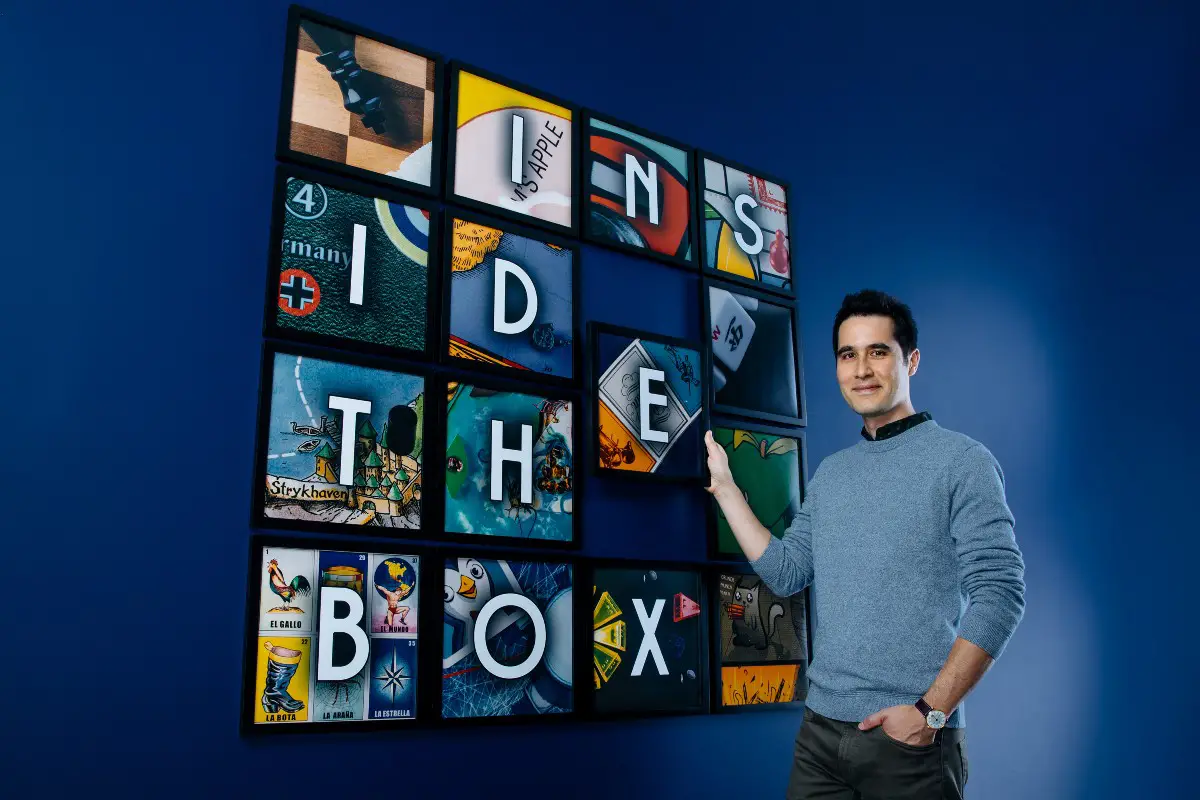
For more information, check out The Geffen’s website, Instagram, Twitter, and Facebook. Check out our Remote Event Guide for more virtual events.

